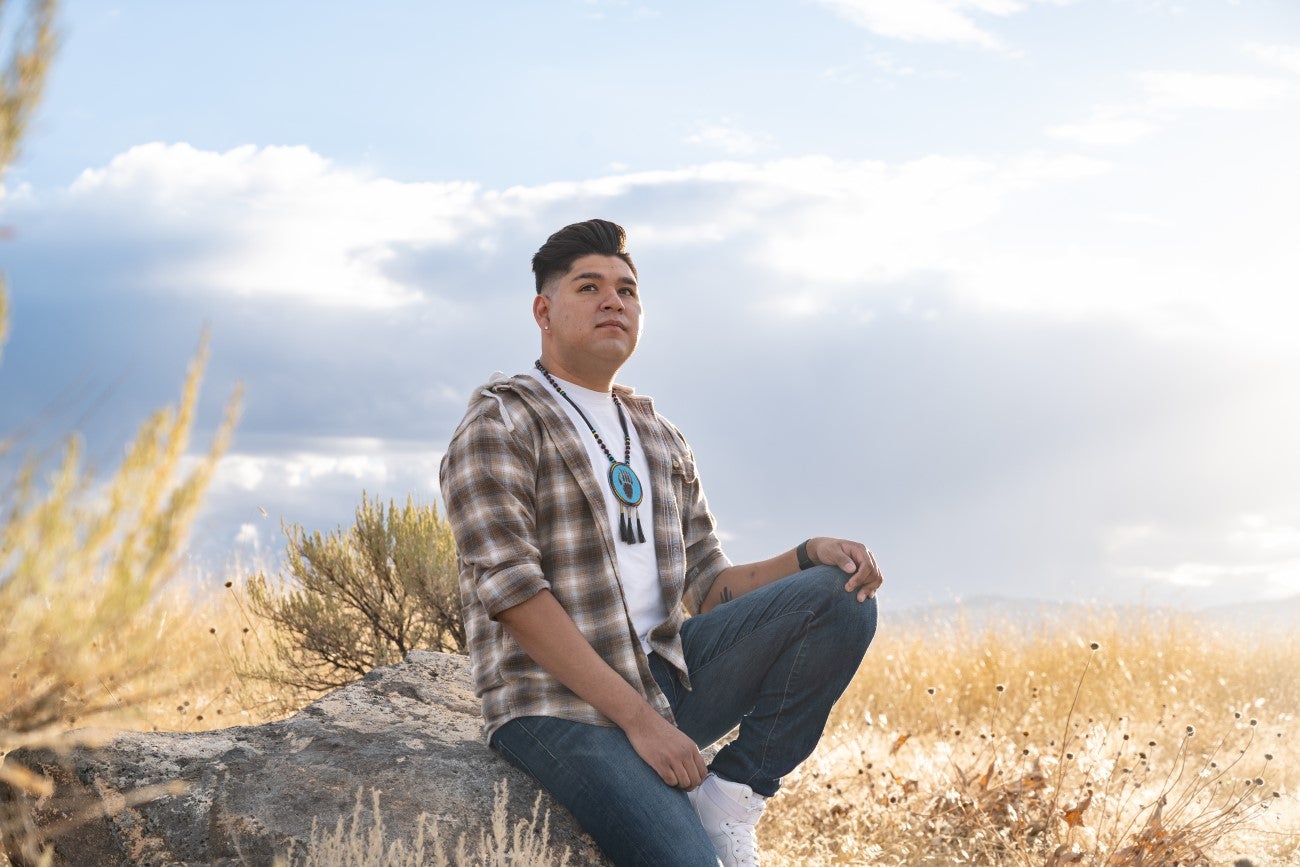
In spring 2022, Boise State hosted the Seven Arrows Powwow, the first on campus in three years and an event that drew an estimated 3,500 citizens of tribes from across the region.
Marco Ovando, a senior majoring in political science and a citizen of the Shoshone-Paiute Tribe of the Duck Valley Reservation that straddles the Idaho/Nevada state line, served as powwow director. Taking on that role, he said, was “like being part of a simultaneous homecoming and family reunion.”
“It was an honor and an obligation to uphold the greatest aspects of my culture – a sense of community, happiness and entertainment through traditions that were almost lost. This defines what being Indigenous means,” he said.
That Ovando had a role usually reserved for older tribal members is evidence of how beloved he is in the native community, said Melanie Fillmore (BS, MA, political science, 2009, 2019). Fillmore is a doctoral student at Boise State in public policy and administration. She got to know Ovando through the Intertribal Native Council, a Boise State student organization.
“He has a keen ear to listen and he wants to make folks, especially native folks, feel welcome on campus. Students and community members feel at home when Marco is around,” Fillmore said.
Fittingly, Ovando worked on campus during summer 2022 as an orientation leader. He helped new students transition to Boise State and talked to them about mental health resources. Mental health is a longstanding cause for Ovando.
United National Indigenous Tribal Youth, a nonprofit organization that advocates for the well-being of native youth, tapped him to testify before Congress in 2020 about mental health struggles in Indigenous communities. He spoke about the urgency of the issue with then-Rep. Deb Haaland, now secretary of the interior, the first Native American woman to serve as a cabinet secretary.
Ovando submitted written testimony and encouraged Indigenous students in Nevada to support Assembly Bill 262, a bill to waive college tuition for indigenous students from one of Nevada’s 27 federally-recognized tribes and to reduce tuition for out-of-state Indigenous students at Nevada institutions of higher education. The bill passed and became law in 2021.
According to Mental Health America, Indigenous people report experiencing serious psychological distress 2.5 times more than the general population over a month’s time.
Ovando credits his family for inspiring his desire to help his community. His grandmother, Charlotte Atkins, was a tribal councilwoman. Now in her 80s, she is still active in tribal government.
“We just have a rich legacy of diplomacy and political awareness. It goes back to Sarah Winnemucca,” Ovando said. Winnemucca, one of his ancestors, was an author and, in 1884, testified before a congressional subcommittee about the forced removal of people from their land. Being able to testify in Congress himself, he said, was coming “full circle” and was all the more meaningful because he was testifying before Haaland.
Ovando also stepped up during the pandemic after noticing that accurate medical information was slow to reach Duck Valley. He founded the community’s first public relations office. He shared public health information through social media and streamed tribal council meetings live on Facebook, keeping people connected during lockdowns.
“Marco displays a commitment to public service that people tend to not develop until later in life,” said Isaac Castellano, an assistant clinical professor in the School of Public Service. “He has that at his core, the desire to serve and the capacity to follow through with modesty and commitment – not for the attention and accolades.”
Ovando will graduate in 2023. He is considering graduate programs in Native American affairs and federal Indian policy – laws, he said, “that impact my life directly, and the lives of all the people I love.”